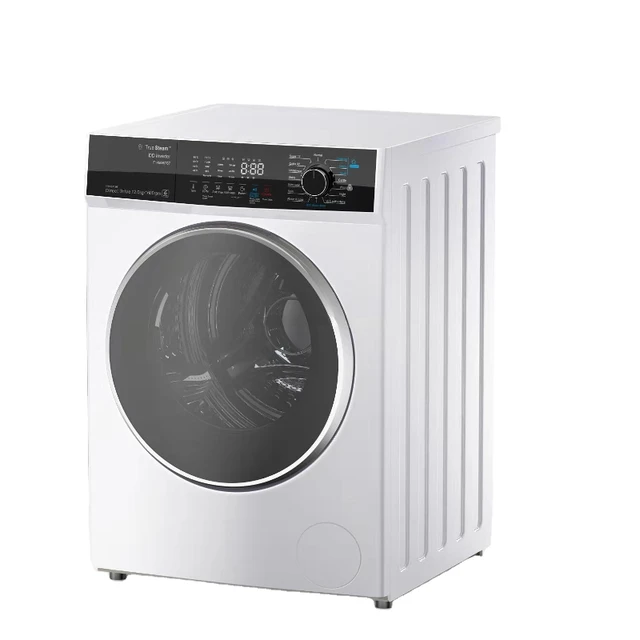How Long Does a Washing Machine Take to Wash Clothes?
Introduction:
The time it takes for a washing machine to wash clothes can vary significantly based on a variety of factors, including the type of washing machine, load size, fabric type, and the chosen wash cycle. While some loads might be completed in as little as 30 minutes, others may take over two hours. Understanding these variables can help you better plan your laundry routine and ensure optimal cleaning performance. This detailed guide explores the different factors that influence washing time, the types of washing machines, common wash cycles, and tips for efficient laundry management.

How Long Does a Washing Machine Take to Wash Clothes:
What Factors Influence the Duration?
Types of Washing Machines:
How Do Different Models Affect Washing Time?
The type of washing machine you use plays a significant role in determining how long it takes to wash clothes.
Top-Loading Machines:
Convenience and Speed:
Top-loading washing machines are often preferred for their ease of use and generally shorter wash cycles. Traditional agitator-style top loaders can complete a wash cycle in approximately 35 to 65 minutes. These machines are designed for straightforward operation and can handle various load sizes, making them suitable for busy households.
High-Efficiency Top Loaders: High-efficiency top-loading machines, which lack a central agitator, use less water and energy but may have slightly longer wash cycles, averaging 60 to 90 minutes. These machines rely on a gentler washing motion and additional soaking time to achieve comparable cleaning results, balancing efficiency with performance.
Front-Loading Machines:
Thorough Cleaning with Extended Cycles:
Front-loading washing machines are known for their efficient water and energy use, as well as their superior cleaning capabilities. However, this comes at the cost of longer wash cycles, typically ranging from 60 to 120 minutes. The tumbling action of front loaders, combined with longer cycle times, ensures deep cleaning and gentle handling of fabrics.
Enhanced Customization: Modern front-loading machines often feature advanced settings and customization options, allowing users to tailor wash cycles to specific needs. While these options enhance performance, they can also extend the duration of a wash cycle, particularly for heavily soiled loads or delicates.
 Load Size:
Load Size:
Why Does the Amount of Laundry Impact Washing Time?
The size of the laundry load significantly influences the overall washing time.
Small Loads:
Efficiency and Speed:
Washing small loads generally requires less time, as the machine can agitate and rinse the clothes more effectively with smaller volumes of water. Quick wash cycles, designed for lightly soiled garments, can complete a load in as little as 15 to 30 minutes. These cycles are ideal for small loads and offer a fast, convenient solution for refreshing clothes.
Balanced Performance: While small loads dry faster and use fewer resources, it’s essential to avoid underloading the machine to maintain energy efficiency. Efficient use of the washing machine involves balancing load size with the appropriate cycle to achieve optimal cleaning without wasting water or energy.
Large Loads:
Extended Cycles for Thorough Cleaning:
Larger loads naturally require more time to ensure thorough cleaning, rinsing, and spinning. The machine must distribute water and detergent evenly across a larger volume of clothing, which can extend the wash cycle. For standard cycles, large loads typically take anywhere from 70 to 120 minutes, depending on the machine’s capacity and settings.
Achieving Balance: Overloading the machine can lead to inadequate cleaning and increased wear on the appliance. To maximize both efficiency and effectiveness, it’s crucial to follow the manufacturer’s guidelines on load size and weight distribution.
Fabric Type:
How Does Material Affect Washing Time?
Different fabric types require varying amounts of time to clean effectively, impacting the overall duration of the wash cycle.
Delicate Fabrics:
Gentle Handling with Longer Cycles:
Delicate fabrics such as silk, lace, and some synthetic materials need gentle handling to prevent damage. Delicate wash cycles typically run longer, around 60 to 90 minutes, using lower agitation speeds and additional soaking time to clean the garments thoroughly without causing wear or tear.
Special Considerations: Using mesh laundry bags or washing delicates separately on gentler cycles can help protect fragile garments and ensure they receive the appropriate amount of care and cleaning.
Heavy Fabrics:
Intense Cleaning Needs:
Heavier fabrics like denim, towels, and bedding require more vigorous cleaning action and extended cycle times. These materials can hold more dirt and moisture, necessitating longer wash and rinse cycles to remove grime effectively. Heavy-duty cycles for such fabrics can range from 90 to 120 minutes.
Enhanced Cleaning Options: For heavily soiled items, pre-soaking or using an extended wash cycle with added detergent can improve cleaning results. Additionally, selecting a higher spin speed can help reduce drying time by extracting more water during the final spin phase.
 Wash Cycles:
Wash Cycles:
What Are the Common Wash Cycles and Their Durations?
The selected wash cycle is one of the most critical determinants of washing machine duration.
Quick Wash:
Speed and Efficiency:
Designed for lightly soiled garments, the quick wash cycle typically lasts around 15 to 30 minutes. This cycle uses a shorter wash time, reduced rinses, and quicker spins to expedite the laundry process. Though convenient, it may not be suitable for heavily soiled or bulky items.
Daily Convenience: Quick wash cycles are ideal for freshening up clothes worn briefly or for laundry emergencies when speed is essential.
Normal Wash:
Balanced Cleaning:
The normal wash cycle is the standard option for most everyday laundry needs, with a duration ranging from 50 to 70 minutes. This cycle balances washing, rinsing, and spinning, making it suitable for a wide range of fabric types and soil levels.
Versatile Solution: Normal wash cycles are versatile and provide reliable cleaning performance for mixed loads containing different fabrics and soil conditions.
Heavy-Duty Cycle:
Intensive Cleaning:
Heavy-duty cycles are designed for heavily soiled items, providing vigorous agitation, extended wash times, and extra rinses. These cycles can take anywhere from 90 to 120 minutes, depending on the washing machine and load size.
Thorough Approach: Ideal for workwear, sports gear, and other tough fabrics, heavy-duty cycles ensure that deep dirt and stains are effectively removed.
Delicate Cycle:
Gentle Handling:
The delicate cycle caters to sensitive fabrics that require gentle treatment. With lower agitation speeds and additional soaking periods, this cycle typically lasts between 60 to 90 minutes.
Protective Care: Using the delicate cycle helps preserve the integrity of fine fabrics, preventing damage while ensuring cleanliness.
 Maintenance Tips:
Maintenance Tips:
How Can Proper Maintenance Influence Washing Time?
Proper care and maintenance of washing machines can enhance their efficiency and potentially reduce washing times.
Regular Cleaning:
Ensuring Optimal Performance:
Regular cleaning of the washing machine prevents the buildup of detergent residue, lint, and mildew, which can affect performance. Running an empty cycle with a machine cleaner or a mixture of vinegar and baking soda can help keep the drum and internal components clean.
Enhanced Efficiency: A clean machine operates more efficiently, ensuring that wash cycles run as intended and are not hindered by internal obstructions.
Load Balancing:
Preventing Strain:
Distributing clothes evenly in the drum prevents the machine from becoming unbalanced during washing and spinning. An unbalanced load can lead to longer cycle times as the machine attempts to redistribute the load, or it may stop altogether if the imbalance is too severe.
Optimized Function: Balancing loads helps ensure smooth operation, reducing wear on the machine and minimizing interruptions during wash cycles.
Regular Inspections:
Proactive Measures:
Inspecting hoses, seals, and other components regularly can help identify potential issues before they affect washing performance. Replacing worn or damaged parts promptly ensures the machine continues to operate efficiently, preventing extended washing durations.
Consistent Performance: Regular maintenance checks contribute to the longevity and consistent performance of the washing machine, helping maintain optimal cycle times.
 Energy Considerations:
Energy Considerations:
How Do Efficiency Settings Impact Washing Duration?
Energy-efficient washing machines and settings can influence the length of washing cycles.
Eco Mode:
Balancing Energy Savings and Duration:
Energy-efficient settings, such as eco mode, are designed to reduce water and energy consumption. However, these cycles often extend washing times, ranging from 90 to 120 minutes, to achieve the same level of cleanliness with reduced resources.
Sustainable Choices: While eco mode extends cycle times, it offers considerable energy savings and reduced environmental impact, making it a worthwhile trade-off for eco-conscious users.
Optimized Wash Programs:
Tailored Efficiency:
Many modern washing machines feature smart technology that optimizes wash programs based on load size, fabric type, and soil level, potentially reducing washing times without compromising cleanliness. These advanced settings provide a customized approach that balances efficiency with performance.
Smart Solutions: Utilizing optimized wash programs allows homeowners to benefit from shorter washing cycles while maintaining high cleaning standards.
Conclusion
The duration of washing machine cycles is influenced by various factors, including the type of machine, load size, fabric type, chosen wash cycle, and the overall condition and efficiency of the appliance. Top-loading machines offer quicker cycles, while front-loading models provide thorough cleaning with extended times. Load size and fabric type further affect washing duration, with larger loads and heavier fabrics requiring more time. The choice of wash cycle is crucial, with quick washes offering speed and heavy-duty cycles providing intensive cleaning. Proper maintenance and balanced loads contribute to efficient operation and consistent wash times. Understanding these factors allows for better planning and optimization of the laundry process, ensuring both effective cleaning and efficient use of time and resources.

